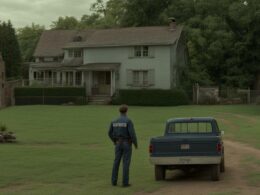As a homeowner, protecting your property from flooding is essential. Backyard flooding can cause significant damage to your home and property, which can be expensive and time-consuming to repair. Fortunately, there are expert tips and solutions you can implement to prevent backyard flooding and enjoy a well-drained backyard all year round.
Post Summary:
- Preventing backyard flooding is crucial to protect your property and avoid costly repairs.
- Assessing your backyard’s drainage system can help identify potential problem areas.
- Implementing effective drainage solutions such as French drains, grading, and rain gardens can prevent backyard flooding.
- Maintaining your drainage system with regular upkeep and annual maintenance can ensure it functions correctly.
Assessing Your Backyard’s Drainage System
Assessing your backyard’s drainage system is an essential step in preventing flooding. By identifying potential problem areas, you can take action to protect your property and prevent water damage. Follow these steps to assess your drainage system:
- Check for standing water: After rainfall, walk around your yard and look for areas where water accumulates. These could be low spots or areas where the ground is compacted.
- Inspect gutters and downspouts: Make sure your gutters and downspouts are clear of debris and water is flowing freely. If water is overflowing from your gutters, it could be damaging your foundation and contributing to backyard flooding.
- Examine your yard’s slope: Your yard should slope away from your home’s foundation. If you notice water pooling near your home, the slope may need to be adjusted.
- Consider your landscaping: Certain landscaping features, such as retaining walls or raised beds, can affect water flow in your yard. Make sure they are not blocking drainage or contributing to flooding.
- Identify problem areas: Once you have completed your assessment, make note of any areas that are prone to flooding or are contributing to flooding in other parts of your yard.
What to Do with Your Assessment Results
If you have identified problem areas in your assessment, don’t panic. There are many effective drainage solutions you can implement to prevent backyard flooding. In the next section, we will provide detailed instructions on how to address these issues and keep your yard dry and well-drained.
Implementing Effective Drainage Solutions
Now that you’ve assessed your backyard’s drainage system, it’s time to implement effective solutions to prevent flooding. Here are some expert tips:
Installing French Drains
If you have a low-lying backyard or one that slopes towards your home, French drains can be an effective solution. These drainage systems use a perforated pipe surrounded by gravel to help water flow away from your home’s foundation. Dig a trench, install the pipe, and cover it with gravel. Properly installed French drains can last for several decades.
Proper Grading Techniques
Improper backyard grading can contribute to flooding. If your yard slopes towards your home, for example, rainwater can accumulate near your foundation and cause damage. Proper grading ensures that water flows away from your home. Consult a professional landscaper if you’re unsure about how to grade your backyard.
Creating Rain Gardens
Rain gardens are an attractive and eco-friendly way to prevent backyard flooding. These gardens use special soil and plants to absorb excess water. They’re especially effective at capturing and filtering runoff from roofs, driveways, and other hard surfaces. To create a rain garden, choose an area in your backyard that collects water and plant native shrubs, flowers, and grasses that can tolerate both wet and dry conditions.
Using Dry Wells
A dry well is a simple yet effective solution for managing excess water on your property. This system uses a large underground container filled with gravel and perforated pipe. Excess water is collected and slowly released into the surrounding soil. Dry wells are typically installed underground and require regular maintenance.
Utilizing Downspout Extensions
Downspout extensions are a quick and easy solution for preventing water from pooling around your home’s foundation. These simple devices attach to your home’s downspouts and direct rainwater away from your home. They’re available in a variety of lengths and styles to match your home’s exterior.
By implementing these effective solutions, you can prevent backyard flooding and ensure that your property stays dry and well-drained. Remember to consult a professional landscaper or drainage expert if you’re unsure about how to implement any of these solutions.
Maintaining Your Drainage System
Properly maintaining your backyard’s drainage system is essential to ensuring it functions correctly and helps prevent flooding. Here are some tips for maintaining your system:
- Regularly clean your gutters: Remove debris and leaves from your gutters at least twice a year to prevent clogs that can impede water flow.
- Remove debris: Keep your backyard free of debris, such as fallen leaves, sticks, and rocks, which can block drainage and create a flood risk.
- Check downspouts: Make sure downspouts are correctly positioned away from your home and that they are not clogged.
- Inspect French drains: At least once a year, check the condition of your French drain and ensure that it is not clogged or damaged.
- Tune-up rain gardens: Remove any debris, prune overgrown plants and add mulch to your rain garden to ensure proper drainage.
- Schedule annual maintenance: Hire a professional to inspect and tune-up your drainage system annually to prevent potential issues before they become severe.
Remember, regular maintenance is crucial to the proper functioning of your drainage system and preventing backyard flooding.
By following these tips, you can ensure your backyard remains dry and well-drained all year round.
Conclusion
Preventing backyard flooding is essential to protect your property and enjoy a dry, well-drained backyard all year round. By following the expert tips and solutions outlined in this article, you can reduce the risk of flooding and keep your backyard in top shape.
Remember to assess your drainage system regularly, identify problem areas, and implement effective drainage solutions such as French drains, grading, rain gardens, dry wells, and downspout extensions. Additionally, maintain your drainage system with regular cleaning and inspections to ensure optimal function.
Don’t forget to schedule annual maintenance to keep your backyard’s drainage system in top condition. By taking these preventative measures, you can avoid costly water damage and enjoy a beautiful, well-drained backyard for years to come.
FAQ
Q: How can I prevent backyard flooding?
A: There are several ways to prevent backyard flooding. Implementing effective drainage solutions, maintaining your drainage system, and assessing your backyard’s drainage system are important steps in preventing flooding. You can also consider installing French drains, grading your yard, creating rain gardens, using dry wells, and utilizing downspout extensions.
Q: What are some common causes of backyard flooding?
A: Some common causes of backyard flooding include poor drainage, heavy rainfall, improper grading, clogged gutters, and compacted soil. It’s important to assess your drainage system and identify any potential problem areas that may contribute to flooding.
Q: How often should I maintain my drainage system?
A: Regular maintenance is crucial to keep your drainage system functioning properly. It is recommended to clean your gutters regularly, remove debris, check downspouts, inspect French drains, and perform tune-ups on rain gardens. Scheduling annual maintenance for your backyard’s drainage system can also be beneficial.
Q: Can I assess and implement drainage solutions on my own?
A: Yes, you can assess your backyard’s drainage system and implement drainage solutions on your own. However, if you’re unsure or need assistance, it’s recommended to consult with a professional in drainage solutions to ensure proper installation and effectiveness.
Q: Why is it important to prevent backyard flooding?
A: Preventing backyard flooding is important to protect your property and enjoy a well-drained backyard all year round. Flooding can cause damage to infrastructure, landscaping, and even the foundation of your home. By taking preventive measures, you can avoid costly repairs and maintain a safe and functional outdoor space.









